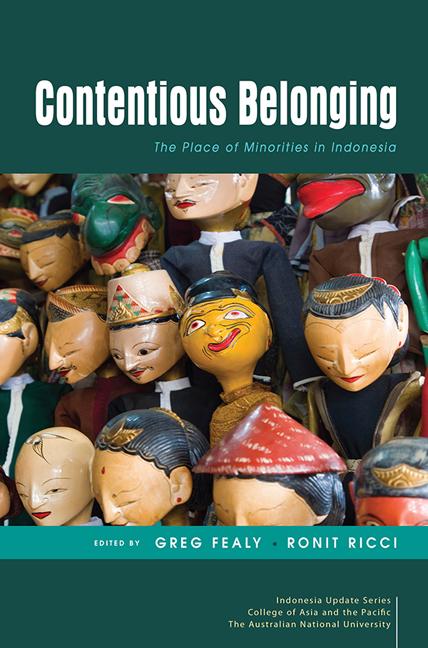Book contents
- Frontmatter
- Contents
- Tables and figures
- Contributors
- Acknowledgments
- Glossary
- Map
- 1 Diversity and its Discontents: an Overview of Minority–Majority Relations in Indonesia
- PART 1 HISTORY AND LAW
- 2 Minorities in Indonesian History: From Ambiguous Advantage to Cantonisation
- 3 Minorities and Discrimination in Indonesia: the Legal Framework
- 4 The Constitutional Court and Minority Rights: Analysing the Recent Homosexual Sex and Indigenous Belief Cases
- PART 2 DISABILITY
- PART 3 SEXUALITY
- PART 4 RELIGION AND ETHNICITY
- PART 5 REFLECTIONS
- Index
- Indonesia Update Series
4 - The Constitutional Court and Minority Rights: Analysing the Recent Homosexual Sex and Indigenous Belief Cases
from PART 1 - HISTORY AND LAW
Published online by Cambridge University Press: 06 September 2019
- Frontmatter
- Contents
- Tables and figures
- Contributors
- Acknowledgments
- Glossary
- Map
- 1 Diversity and its Discontents: an Overview of Minority–Majority Relations in Indonesia
- PART 1 HISTORY AND LAW
- 2 Minorities in Indonesian History: From Ambiguous Advantage to Cantonisation
- 3 Minorities and Discrimination in Indonesia: the Legal Framework
- 4 The Constitutional Court and Minority Rights: Analysing the Recent Homosexual Sex and Indigenous Belief Cases
- PART 2 DISABILITY
- PART 3 SEXUALITY
- PART 4 RELIGION AND ETHNICITY
- PART 5 REFLECTIONS
- Index
- Indonesia Update Series
Summary
Since its establishment 15 years ago, Indonesia's Constitutional Court has become a forum in which various minorities have been able to pursue their interests, often in the face of subjugation by larger groups and even the state itself. These minorities include customary law (adat) communities, whose dependence on natural resources such as forests and coastal areas has brought them into conflict with the interests of the state and businesses, who often claim a legal entitlement to those resources. They also include adherents of so-called ‘deviant’ sects—that is, those who call themselves believers of a religion officially recognised in Indonesia, but believe in a ‘version’ of that religion that, at least in the view of some religious authorities, diverges from the orthodox tenets of the religion. The cases involving these two minority groups have drawn significant controversy and been the subject of much academic writing (Budiwanti 2009; Butt 2014; Crouch 2011, 2012; Fenwick 2017; Lindsey 2012: 20; Lindsey and Pausacker 2016; Lindsey in this volume).
The court's constitutional review function potentially offers minority groups an avenue to use the court as both a ‘sword’ and a ‘shield’. As a ‘sword’, the court enables these groups to actively push for legal change in the face of legislation that appears to discriminate against them or to disregard their constitutional rights. As a ‘shield’, the court has allowed them to seek to protect themselves from legislation that violates their constitutional rights.
This chapter focuses on two Constitutional Court cases handed down in late 2017 involving two other broad minority groups, upon whose interests the Constitutional Court had not previously adjudicated. These cases drew significant public attention and controversy but very little has yet been written about them. The first of these cases touched upon the interests of some of Indonesia's lesbian, gay, bisexual, transgender, queer and intersex (LGBTQI) community, which has suffered increasing intolerance in recent years (Firdaus 2018; see also Chapter 7 by Wieringa and Chapter 8 by Wijaya in this book). In December 2017 the court handed down its decision in a case brought by members of a conservative Muslim group, the Family Love Alliance (Aliansi Cinta Keluarga, AILA). Among other things, they challenged Article 292 of the Criminal Code, which prohibits ‘indecent activities’ (perbuatan cabul) with a minor of the same gender as the perpetrator.
- Type
- Chapter
- Information
- Contentious BelongingThe Place of Minorities in Indonesia, pp. 55 - 74Publisher: ISEAS–Yusof Ishak InstitutePrint publication year: 2019



